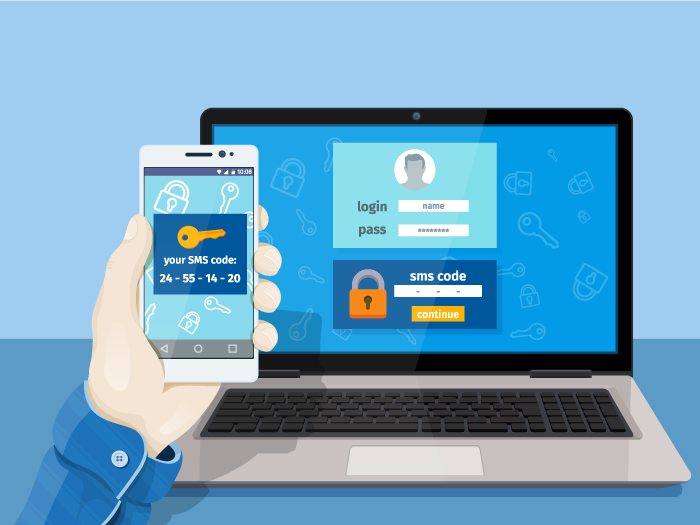You are viewing our site as an Agent, Switch Your View:
Agent | Broker Reset Filters to Default Back to ListWhat's the Safest Way to Manage Your Passwords?
August 12 2019
 It may be the biggest Catch-22 of technology: password protection keeps your data safe. After all, one in five Americans says they have experienced a compromise of an online account. But to be genuinely safe experts recommend using different, highly complex passwords: a mix of random letters, numbers, and characters. However, that approach makes these passwords nearly impossible for most people to remember!
It may be the biggest Catch-22 of technology: password protection keeps your data safe. After all, one in five Americans says they have experienced a compromise of an online account. But to be genuinely safe experts recommend using different, highly complex passwords: a mix of random letters, numbers, and characters. However, that approach makes these passwords nearly impossible for most people to remember!
To solve this challenge, research by Digital Guardian found that nearly 40 percent of people use the same password to access multiple sites and accounts. Others use a core password and then add a slight variation. That can increase your risk, security experts warn, because if a hacker figures out your password for one site, it would be easier to access your other sites and accounts.
Plus, many firms require you to change your password frequently and often prevent you from reusing a recent password. That compounds one's password quandary.
One in five others solves their password dilemma by writing down passwords on paper or storing them in their computer. The problem with this approach is that many people keep their passwords nearby their computers, or, ironically, don't password-protect or keep in a safe the document that contains all their passwords.
Bad password habits are not limited by age group. Researchers found that the age group most likely to reuse passwords – 76 percent in fact – were those ages 18 to 24. That's 15% higher than the next age group most likely to use passwords, those 65 years and older at 61% percent.
What is the safest way to manage your passwords?
Experts recommend using a password manager. Password managers keep your passwords together in one place. They automatically create strong passwords for you, inserting them as you log into your different accounts.
CNET, a leading computer and software review magazine, provides a list of their top-ranked password manager programs here. CNET profiles many of the popular password manager options, including 1Password, Blur, Sticky Password, Password Boss, Last Pass, and more.
CNET ranks Keeper as the top choice, which offers a free version that includes all the features most people need: unlimited password storage, autofill passwords, unlimited payment and identity info, fingerprint and Face ID login and all accessible on a single device. Their paid version is $2.50 a month, which includes giving you access to your passwords on all of your devices.
How safe are password managers?
The typical password manager uses multifactor authentication. This is a two-step process that makes your passwords safe. Your passwords are stored in what is essentially a "digital vault." Access to your vault is only possible when you enter both a correct password and an authentication code. Your authentication code is on the device you own, keeping online hackers away from your information.
A password manager makes sure your vault is protected by encrypting your password information locally before it ever leaves your device. Finally, your passwords are stored, in an encrypted form, on the program manager's servers.
What else can you do to keep your information safe?
Once you have a password manager, you can keep your passwords more secure by following a few password best practices. Security experts recommend that you should change your passwords regularly. Unfortunately, 56% of people say they keep their same passwords for a year or more. It's safer to be among the 44% who change their passwords at least once a year or less.
Never reuse the same password. That may be the biggest benefit a password program manager for most people provides. Because a password program manager can generate complex passwords and remember them for you, the idea of creating different complex passwords for every account and site you own — and changing them often — is not as ominous.
Updating your technology also helps make you more secure. Most newer smartphones and laptops provide an extra layer of security protection by locking your device until you provide your fingerprint. Face recognition is also being used regularly now with smartphones, reducing the need for you to type in a password.
Some sites offer a newer password option: allowing you to use a common language phrase – known as a passphrase – instead of random letters, numbers, and characters. For example, a passphrase could be "stop beating around the bush." It's much easier to remember than a highly sophisticated password, and passphrases can be just as safe or safer, security experts argue.
Finally, experts recommend you always select two or multifactor authentication. You probably recognize this when you are using a public computer (like one in a hotel), and when you enter the correct password and username, you are taken to a page that will provide you with a one-time code to enter, typically via email, a phone call, or a text to your phone. You won't be granted access until you provide the correct code you are sent.
All of these practices together provide you extra layers of security. The key is when you do these things, you massively reduce your chances of your passwords being hacked.
To view the original article, visit the Tech Helpline blog.









